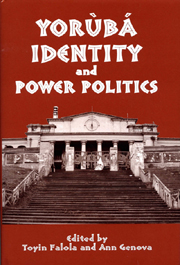Book contents
- Frontmatter
- Contents
- List of Illustrations
- Introduction
- Part I Writing Yorùbá
- Part II Chiefs and Tradition
- Part III Identity and Modern Politics
- 12 Approaching the Study of the Yorùbá Diaspora in Northern Nigeria
- 13 Yorùbá-Nigerians in Toronto: Transnational Practices and Experiences
- 14 Yorùbá Factor in Nigerian Politics
- 15 Politics, Ethnicity, and the Struggle for Autonomy and Democracy
- 16 Petroleum and Ethno-Politics
- 17 Chief M. K. O. Abiọla's Presidential Ambitions and Yorùbá Democratic Rights
- Notes on the Contributors
- Index
13 - Yorùbá-Nigerians in Toronto: Transnational Practices and Experiences
from Part III - Identity and Modern Politics
Published online by Cambridge University Press: 12 September 2012
- Frontmatter
- Contents
- List of Illustrations
- Introduction
- Part I Writing Yorùbá
- Part II Chiefs and Tradition
- Part III Identity and Modern Politics
- 12 Approaching the Study of the Yorùbá Diaspora in Northern Nigeria
- 13 Yorùbá-Nigerians in Toronto: Transnational Practices and Experiences
- 14 Yorùbá Factor in Nigerian Politics
- 15 Politics, Ethnicity, and the Struggle for Autonomy and Democracy
- 16 Petroleum and Ethno-Politics
- 17 Chief M. K. O. Abiọla's Presidential Ambitions and Yorùbá Democratic Rights
- Notes on the Contributors
- Index
Summary
At any rate it is clearly understood that the been-to has chosen, been awarded, a kind of death. A beneficial death, since cargo follows his return. Not just cargo but also importance, power, radiating influence capable of touching ergo elevating all those who in the first instance have suffered the special bereavement caused by the been-to's going away… So how close are we to Melanesian islands? How close is everybody…?
Until the late 1980s, scholars had conceived of international immigration as simply job enrichment for the economically advanced countries of the world. The social phenomenon of migration/immigration was inexhaustibly explored within the framework of a push-pull couplet. In their scholarly works on transnationalism, Glick Schiller, Basch, and Szanton Blanc emphasize how international migration is not simply about reproduction of unequal social relations; rather immigrants are social agents who are actively resisting their exploitation by maintaining social ties across geographic boundaries. To this end, they define transnationalism and transmigrants:
as the processes by which immigrants build social fields that link their country of origin and their country of settlement. Immigrants who build such social fields are designated “transmigrants.” Transmigrants develop and maintain multiple relations—familial, economic, social, organizational, religious, and political that span borders. Transmigrants take actions, make decisions, and feel concerns, and develop identities within social networks that connect them to two or more societies simultaneously.
- Type
- Chapter
- Information
- Yorùbá Identity and Power Politics , pp. 251 - 272Publisher: Boydell & BrewerPrint publication year: 2006

